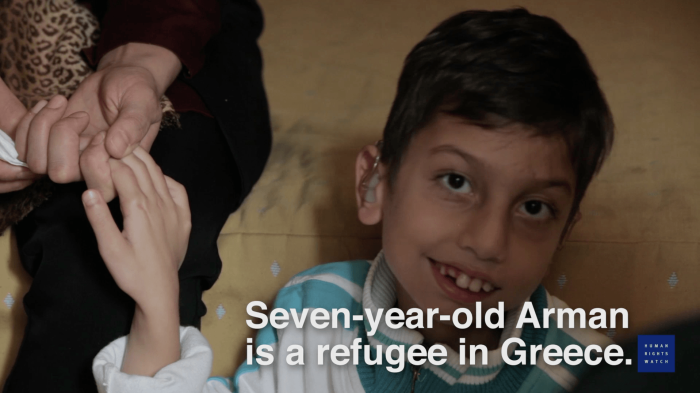Greece: Refugees with Disabilities Overlooked, Underserved
Read a text description of this video
Arman has difficulty going to the bathroom, taking a bath, dressing and eating, I have to do it [for him].
Seven-year-old Arman is a refugee in Greece.
He’s just one of the 62,000 who are stranded there,
and one of the many living with a disability.
The deeply flawed EU-Turkey deal,
border closures in the Balkans,
mismanagement and lack of coordination,
have all added up to create a humanitarian crisis inside Greece.
Many have fled brutal violence from countries like Syria, Iraq and Afghanistan.
[My 13-year-old son Omar] saw his father being beheaded [by ISIS fighters].
They beat him and threw him down—he fell on top of his father’s body. Then they beat him again.
He can’t walk. A doctor in Turkey said it was [trauma].
In the camps, people with disabilities
don’t have equal access
to basic services
such as toilets and showers.
[In Moria camp] we struggled to get food because it was crowded. [There were] no showers, the water was cold, and the bathrooms were far away. It was overwhelming.
Their surroundings
can put them at particular risk.
Omar hurt his head several times because of the gravel on the ground. The ground isn’t smooth so his wheelchair fell over.
I feed her, I brush her teeth, brush her hair, and I dress her. I do everything.
Tarek said his mother suffered extreme trauma in Syria and became unable to walk.
She witnessed the shooting of a 16 and 17-year-old boy. She couldn’t save them.
Her condition is getting worse because she keeps reliving what happened.
I think every person that lives in [Souda] camp is in need of psychological support.
They suffer stress because of the difficult conditions they live in.
I had to carry [my sons with disabilities] one by one to the bathroom.
Then I’d clean each of them and bring them back [to the tent].
[In Kara Tepe] there were people in worse condition than my mother. They had lost their legs in the conflict in Syria.
One billion – one in seven people – live with a disability worldwide.
For people who have fled violent conflict, the figure is likely even higher.
Every parent wishes to raise their kids healthy and give them a hopeful future.
Since 2015, Greece has received more than
€125 million in refugee aid
and €370 million has been raised
to fund humanitarian agencies there.
With so much support,
why aren’t refugees with disabilities
getting the services they need?
The European Union has provided significant funding to the Greek government, and to United Nations and nongovernmental agencies, to operate the centers on the Greek eastern Aegean islands, known as “hotspots,” and camps on the mainland. But asylum seekers and other migrants with disabilities have particular difficulties getting basic services such as shelter, sanitation, and medical care, and like other vulnerable migrants, have limited access to mental health care. For example, one older woman who uses a wheelchair had not been able to take a shower for a month.
